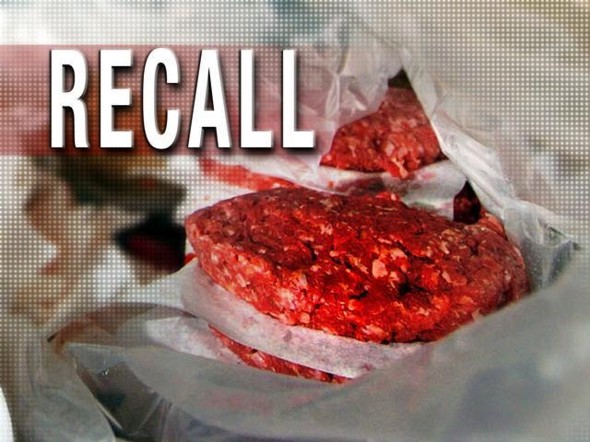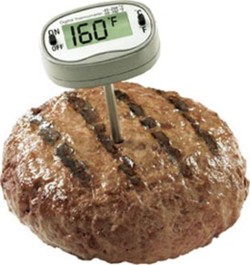Midwest E. Coli Scare Also Effecting Restaurants Nationwide
 December 29, 2009
December 29, 2009  Kyriaki (Sandy) Venetis
Kyriaki (Sandy) Venetis  Image courtesy of www.ecoliblog.com.
Image courtesy of www.ecoliblog.com.
As a precaution, National Steak and Poultry is recalling approximately 248,000 pounds of beef products that may be contaminated with E. coli 0157:H7. This form of the bacteria is among the more dangerous ones, according to the Centers for Disease Control and Prevention.
Bloody diarrhea and stomach pains are the most common signs of this form of the bacteria, according to the CDC, but adds that people shouldn’t except it to be accompanied by a big fever, if any at all.
The greatest concern is for children under five years old and the elderly. In especially vulnerable people, this form of the bacteria can cause damage to red blood cells and kidneys. This only happens to about one-in-50 people, says the CDC, but without hospitalization, they can die.
This recent outbreak came to light through an investigation by the Food Safety and Inspection Service, which is a division of the United States Department of Agriculture.
Working with the CDC, state health and agriculture departments, the FSIS determined that there is an association between non-intact steaks (blade tenderized prior to processing) and illnesses in Colorado, Iowa, Kansas, Michigan, South Dakota, and Washington.
National Steak released a statement saying, “Based on epidemiological evidence, provided by the FSIS, some of our products could potentially be implicated in an outbreak. Therefore, as a precautionary measure, on Dec. 24, 2009, National Steak and Poultry has initiated a voluntary recall” of specific products. Beyond regional markets, these products were also sold to restaurants nationwide.
The company went on to say, “We take the safety and wholesomeness of our products very seriously and that’s why we are working with the USDA to conduct the recall. This is the first recall in our company’s 30-year history. Given our long history of focusing on product safety and our standards of excellence, we will error on the side of being cautious with this recall.”
All verified recalled meats should be discarded by consumers. Beyond that, the FSIS makes the following recommendations for the safe preparation of fresh and frozen ground beef:
- Refrigerate raw meat and poultry within two hours after purchase, or one hour if the outside temperature exceeds 90° F. In addition, refrigerate cooked meat and poultry within two hours after cooking.
- Wash hands with warm, soapy water for at least 20 seconds before and after handling raw meat and poultry. Wash cutting boards, dishes and utensils with hot, soapy water. Immediately clean spills.
 Image courtesy of the University of Florida.
Image courtesy of the University of Florida.
- Keep raw meat, fish, and poultry away from other foods that will not be cooked. Use one cutting boards for raw meat and poultry, and another board for other foods.
- Consumers should only eat ground beef patties that have been cooked to a safe internal temperature of 160° F., whether prepared from frozen or fresh meat products. A cooking/meat thermometer should be used to check the temperature.
The CDC makes the same recommendations, with the following additions:
- If a restaurant serves you an undercooked hamburger, send it back for more cooking. Ask for a new bun and a clean plate, too.
- Never put cooked hamburgers or meat on the plate they were on before they were cooked.\
- Drink only pasteurized milk, juice, or cider. Frozen juice or juice sold in boxes and glass jars at room temperature has been pasteurized, although it may not say so on the label.
- Drink from safe sources like municipal water that has been treated with chlorine, wells that have been tested, or bottled water.
- Do not swallow lake or pool water while swimming.
E. coli is a common kind of bacteria that lives in the intestines of animals and people. Most forms of the bacteria are harmless, and some of the more unexpected ways it can be spread, according to the CDC, are the following:
- People who have not washed their hands after going to the toilet.
- Playmates of toddler who are not toilet trained, or by adults who do not wash their hands carefully after changing diapers. Children can pass the bacteria in their stool to another person for two weeks after they have gotten well.
Readers can find out more information about what to do if they suspect they have been infected with the bacteria through the USDA Meat and Poultry Hotline at 888-674-6854. National Steak has also established a hotline at 866-439-7348.
Reader comments and input are always welcomed!
 National Steak and Poultry,
National Steak and Poultry,  e.coli,
e.coli,  meat recall | in
meat recall | in  USDA,
USDA,  drinks,
drinks,  food,
food,  immune system,
immune system,  national recall
national recall 